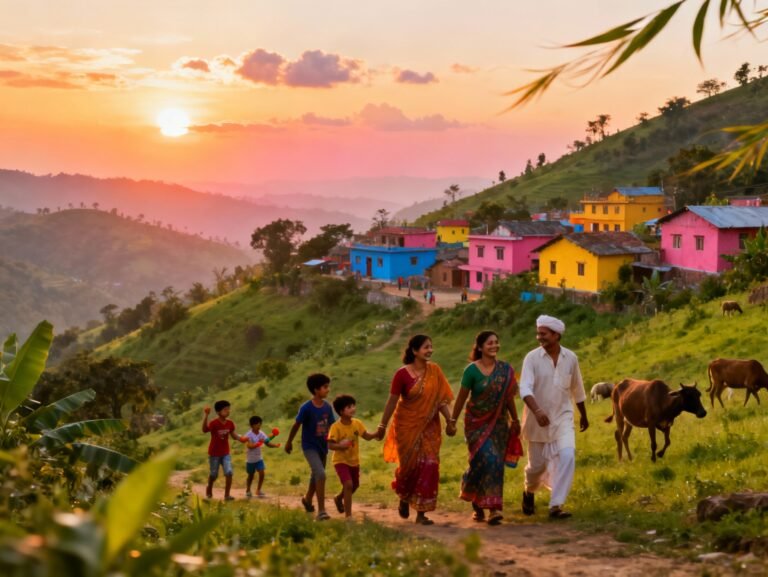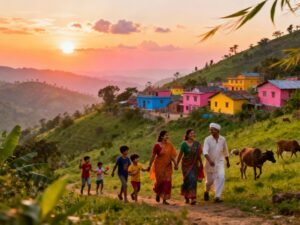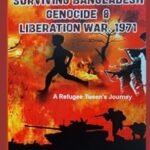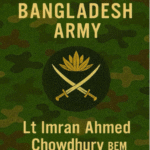I write these lines not as a distant observer of history, but as someone who was carved by it. My childhood was filled with the thunder of boots, the trembling of mothers, and the raw cries of grief. I was only eleven years old in 1971, but the war for Bangladesh’s independence has never left me. It seeps into my bones, shapes my words, and instructs my conscience.
I carry with me two names that are more than family. They are symbols of courage and sacrifice. My father, Fazlul Haque Chowdhury, the first company commander of the East Pakistan Rifles in Shamshernagar, revolted on the 27th of March 1971—lighting a flame of defiance in Sylhet that spread across the land like wildfire. He stood against the mighty Pakistan Army when others were still calculating, hesitant, or afraid. That revolt, modest in its beginning, became the spark that ignited a sector of resistance.
And then there is my brother, Babul, just seventeen. He had hardly crossed the threshold into manhood when he left home to join the guerrilla forces deep in the countryside. He never returned. On the holy day of Eid, the Pakistan Army captured him, tortured him, and left his young body to rot on the banks of the River Titas in Brahmanbaria. They thought they could throw his flesh into the mud and erase his name. They were wrong. His memory is stitched into mine. It is a scar, but it is also a lantern.
Our family fled into exile, crossing into India with millions of others. We lived the life of refugees, dependent on kindness, stripped of home. I remember the long queues for food, the endless waiting, and the smell of sweat and sorrow in the makeshift camps. And I remember, too, the quiet dignity of survival. Even in that exile, we knew that freedom was not a dream but a debt—a debt to those who had already paid with their lives.
And yet, more than five decades later, I see the betrayal of that debt. I see the betrayal in the way our secular inheritance has been bartered away to political expediency. I see it in the return of the very forces who once collaborated with our oppressors, who now strut in the corridors of power, dressed in respectability but carrying the same poison. I see it in the creeping erasure of history, in the manipulation of memory, and in the cynical deals that make our martyrs seem like inconvenient ghosts.
It is from this wound—personal and national—that I dream of another Bangladesh. A utopia, perhaps, but one carved out of necessity.
A Utopia Born of Pain
The Bangladesh I imagine is not founded on vengeance, though vengeance would be the easy cry. After all, I lost my brother to the butchers of ’71. My father carried his revolt like a torch and bore its scars. My childhood was amputated by exile. If anyone has a claim to revenge, perhaps I do. And yet I have lived long enough to know that revenge reproduces what it seeks to destroy.
So the utopia I imagine is not a river of blood but a garden of justice. It is a Bangladesh that rises, phoenix-like, from its wounds—a country where the past is neither denied nor weaponised, but faced with courage and used as a foundation for truth.
In Bangladesh, truth is not a slogan. It is an institution. Imagine public halls across every district where survivors tell their stories, where records are kept, and where the names of the dead are etched into stone so no government, no political party, and no opportunist can ever erase them again. My brother’s name—Babul—would be among them, not in a corner of family memory but in the open air of national recognition.
In Bangladesh, justice is not selective. It does not protect the powerful or punish the poor. Those who collaborated in 1971, those who laundered money, and those who used religion as a shield for greed — all are subject to the same law. No impunity, no immunity, no invisible deals. Trials would be public, evidence would be transparent, and the guilty would face punishment that is just, not vindictive.
In Bangladesh, education is the true weapon of the people. Children would learn not the poisoned half-truths of textbooks rewritten by each ruling party, but the plural, difficult, beautiful story of our land. They would learn about the peasants and the poets, about Nazrul and Tagore, and about the syncretic traditions that made Bengal a meeting place of civilisations. They would learn to debate without hatred, to question without fear. Madrassa students and secular schoolchildren would sit together in joint civic classes, learning the values of dignity, diversity, and dialogue.
In Bangladesh, culture is reclaimed. The songs of Lalon Fakir, the ballads from the haors, and the words of Jibanananda Das would be louder than any hate speech. Festivals would be celebrations of shared humanity, not political rallies masquerading as faith. Memory itself would become culture: every year, citizens would gather for a “Festival of Liberation,” not to glorify war but to honour sacrifice and renew the covenant of democracy.
In Bangladesh, economics would be fair. The rural poor would not be left at the mercy of loan sharks or landlords. Farmers would work in cooperatives that returned dignity to their labour. Women would own businesses, not just labour in sweatshops. The young would not flee abroad in desperation but stay to build because opportunity lived here, not elsewhere.
And in this Bangladesh, power would be accountable. Citizens’ councils would oversee parliament, police, and procurement. A corrupt politician could not hide behind party colours; a general could not hide behind his uniform; a business tycoon could not hide behind his wealth. The days of impunity would be over.
The True Revenge
If revenge has any place in this vision, it is only in this: the revenge of truth against lies, the revenge of justice against impunity, the revenge of education against ignorance, the revenge of dignity against humiliation.
It is the revenge of seeing a child from a village school stand up in parliament as an honest lawmaker. It is the revenge of a farmer reclaiming land once stolen by a war profiteer. It is the revenge of a journalist exposing corruption without fear. It is the revenge of mothers who lost sons in 1971, finding their names carved in national memorials, no longer whispered in private grief but honoured in collective pride.
For me, it is the revenge of knowing that my brother Babul did not die in vain—that his short life of courage is woven into the fabric of a nation that has finally chosen dignity over deceit. It is the revenge of knowing that my father’s revolt in Shamshernagar was not a footnote but a prologue to a continuing story of resistance against tyranny.
Carrying Memory Forward
Why do I write this? Because utopias are not fantasies. They are compasses. They tell us where to walk, even if we never fully arrive.
I know my country is not yet the Bangladesh I describe. I know the dark hands of opportunism, corruption, and imported ideology still claw at our future. I know the betrayal of 1971 still lurks in many corridors of power. But I also know this: no tyranny lasts forever. No lie can outlive truth. No opportunist can erase the blood of martyrs.
When I close my eyes, I see a Bangladesh where the next generation no longer has to carry our grief like a wound but can carry it like a lesson. I see children reciting my brother’s name in schoolbooks. I see farmers tilling land that no longer belongs to absentee landlords. I see journalists investigating without fear of midnight knocks. I see politicians trembling not before generals or foreign masters but before the honest scrutiny of citizens.
And I see myself, old and grey, standing at the banks of the River Titas, whispering my brother’s name into the water—not in grief, but in peace.
This is the Bangladesh I dream of.
This is the Bangladesh we can still build.
And this is the Bangladesh my father and brother deserve.




